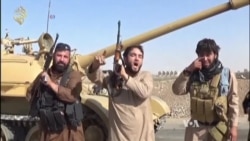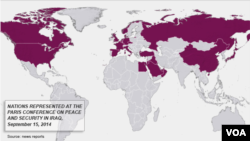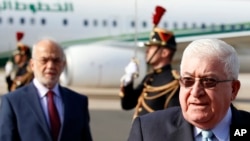U.S. jets have bombed Islamic State targets southwest of Baghdad, in an expansion of the U.S. campaign against the militant group in Iraq.
The Pentagon said late Monday this is the first strike as part of an expanded effort to go beyond protecting U.S. personnel and interests, as Islamic State goes on the offensive.
Another airstrike was carried out near Mount Sinjar in northern Iraq.
President Barack Obama told the nation last week that the U.S. would expand its military effort against Islamic State and lead a relentless effort to destroy the militants wherever they exist.
Obama has authorized airstrikes on Islamic State in Syria, but has not yet decided whether to launch them.
A senior official has warned Syria not to interfere with U.S. air action, saying the U.S. could retaliate against Syrian air defense systems.
Obama has ruled out working with Syrian President Bashar al-Assad against Islamic State, which is fighting to topple him. The U.S. regards President Assad as an illegitimate leader and a criminal.
Top Diplomats Pledge Support
About 30 countries have pledged to support Iraq in its fight against Islamic State militants by "all means necessary," including military aid.
In a statement following a Monday conference in Paris on the crisis, diplomats said aid should come in line with "needs expressed by the Iraqi authorities, in accordance with international law and without jeopardizing civilian security."
The meeting highlighted the "urgent" need to remove the Islamic State group from regions where it has established itself in Iraq. The officials also agreed to continue and increase emergency humanitarian aid to Iraqi authorities.
The conference included officials from about 30 countries, the United Nations, European Union and the Arab League.
It is the latest step in an effort to build a coalition to battle the Islamic State group, which has taken over large areas in northern and western Iraq as well as eastern Syria.
'No time to lose'
French President Francois Hollande said there is "no time to lose" in the fight against Islamic State militants. As he spoke on Monday, French jets carried out their first reconnaissance flights over areas where the militants are operating in Iraq.
Besides posing a threat to the Middle East, the Islamic State group is a menace for Western nations like France, where authorities estimate roughly 1,000 people have left to join the jihadist movement, Hollande added.
The talks followed a tour of the Middle East by U.S. Secretary of State John Kerry to gain support for President Barack Obama's plan to deal with Islamic State militants.
Kerry said a growing number of countries are prepared to join the fight, including several Arab nations offering to give military aid and carry out airstrikes, if needed.
Neither Syria nor Iran were invited to the conference.
On Monday, the United States ruled out military coordination with Iran involving Islamic State militants in Iraq but said it is open to future talks.
Iran rejects coalition
Iran's Supreme Leader Ayatollah Ali Khamenei said the U.S. ambassador in Iraq asked for Iran's cooperation, but that the request was rejected because the U.S. has "dirty hands."
Iraqi President Fouad Massoum urged world powers to pursue Islamic State militants wherever they are. They must not be allowed any sanctuary, he said.
Massoum said Iraq welcomed humanitarian and military support to fight the militants, including airstrikes, but he ruled out ground troops.
He highlighted the importance of taking action against the Islamic State group, saying it is "in the interest of everyone."
"If this group installs itself in Iraq, this will create of a lot of problems in Iraq, the region and the world," Massoum said. "We must try to be helped by other countries so there is international mobilization against this group that wants to install itself in Iraq and from there unleash itself on the world."
Massoum said he thinks Iran should have been invited, given the long shared border with Iraq and the humanitarian aid Iran has been providing during the crisis.
Lisa Bryant contributed to this report from Paris, France








